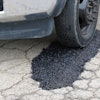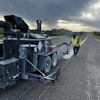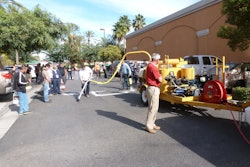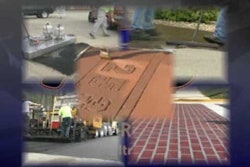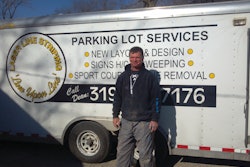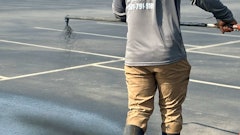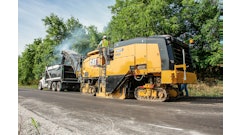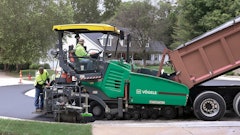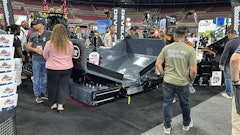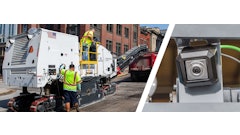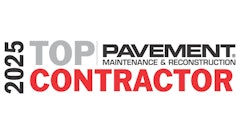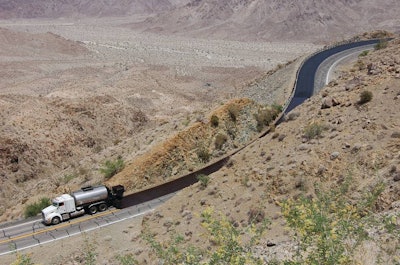
Rejuvenating seals (also known as fog seals) are a method of adding asphalt to an existing pavement surface to improve sealing or waterproofing, prevent further stone loss by holding aggregate in place, or simply improve the surface appearance. California's DOT Caltrans used Western Emulsions PASS AB rejuvenating fog seal on its Hwy 395 Corridor through Bishop, CA.
Used by many large agencies and DOTs, PASS QB emulsion is spray-applied to seal minor distress cracks and add new asphalt to the wearing course. PASS QB is a polymerized asphalt surface sealer designed to rejuvenate and extend the service life of pavement.
"By using a fuel-resistant polymer, PASS QB becomes a vehicle by which we can deliver a significant dose of rejuvenator to oxidized pavement, seal the surface and restore its natural chemical balance and color," says Phil Vandermost, vice president of marketing with Western Emulsions.
Hwy 395 project
PASS QB has been applied to many sections of Hwy 395 in California, including in and around Bishop, Sherwin Grade, Lone Pine and Olancha, treating almost 50 lane miles in 2012.
"The roadways treated were beginning to oxidize – an effect of age and weathering," says Vandermost. "The surface was becoming brittle, less flexible, graying, beginning to lose minor surface rock, but overall in relatively good shape. Being a true pavement preservation treatment, PASS QB is used on roadways in good shape as the effects of oxidization start to set in. This treatment also often helps seal and heal minor cracks."
The treatment was applied in conjunction with Main Street Materials and Deco Pave, both contractors registered as partners with Caltrans. The projects were completed in concert with Caltrans forces, who provided traffic control and scheduling.
Glen Tedrow with DecoPave has been using PASS QB for the last six or seven years. "It's a great product, and Caltrans really likes to keep its roads in good shape," he says. "This is a very cost effective technique to keep good roads in good shape."
Paul Noring, president, Main Street Materials, has been working with Caltrans for 20 years and with PASS QB for many years on many projects. He says using a rejuvenating seal is like "taking a snapshot of the road then maintaining that snapshot."
"To use this type of product, you need a road with very little damage," he explains. "A fog seal is used to help with oxidation and to maintain the condition of the road. You're going to extend the life of this road by another 3 to 5 years without doing anything more than applying the rejuvenating seal. It's like using sunscreen when you're a toddler – it protects from sun damage to your skin years down the road."
The greatest challenge to the Hwy 395 project was the fast return to traffic that was required. PASS QB is a quick-breaking product, which means that the emulsion is chemically engineered to expel its water content and cure rapidly.
"We had extensive traffic just south of Bishop," says Tedrow. "We had to keep the traffic flowing. This rejuvenating sealer allows us to get in and out quickly on a job. It was much faster than having to go in and reconstruct the entire pavement. The public isn't inconvenienced for a long period of time and exposure to accidents both for construction workers and the driving public is lessened."
PASS QB met the requirements of the Caltrans Traffic Section allowing traffic return in as little as two hours. The product was also tough enough to resist the constant 18-wheeler traffic, says Noring.
Skid values
One downside of fog seals is their ability to change the skid value of a road. Emulsions that are not adequately diluted with water may not properly penetrate the surface voids resulting in excess asphalt on the surface of the pavement after the emulsion breaks, which can result in a slippery surface.
"Some agencies won't consider fog seals because of the changing skid values," says Noring. One way to lessen the problem is by adding texture to the fog seal.
Western Emulsions recently developed a process called Texture Seal, which combines the PASS QB product with a simultaneous application of jet-black sand. "It's a one-step process that can mitigate the skid value concern," says Noring.
Texture Seal provides all of the benefits of a fog seal, while adding a micro-texture to the surface that enhances skid resistance to the roadway for better road safety at higher vehicle speeds.
"While agencies are sometimes reticent to fog-seal busy highways and arterial roads due to the temporary loss of skid numbers, the Texture Seal process mitigates this concern, and in fact can increase a road’s skid resistance in certain instances," says Vandermost. "Texture Seal does this without clogging the void structure of open or gap-graded pavements (OGFC), including rubberized (RAC) roadways."
Texture seal was applied in the middle of Bishop both during the day and at night during the Hwy 395 project. "The product worked well, prevented any loss of skid resistance, and reduced the risk of asphalt emulsion ‘tracking’ on tires from the treated areas to other portions of the highway," says Vandermost.
Why Caltrans chose rejuvenating seals
Rejuvenating seals offer many benefits. They are an inexpensive way of arresting raveling and adding binder back into aged surfaces. Like other preservation techniques, the key is choosing the right treatment for the right road at the right time.
"You have to have a road in fairly good condition," says Noring. "Rejuvenating fog seals will help with oxidation and maintaining the condition of the road, but there has to be very little damage to the pavement for it to be effective."
The low cost of rejuvenating sealing is also attractive to agencies. "It's pennies per square foot," says Tedrow. "Compare that to the cost of a full rehab/reconstruct of a road and you can see how cost effective it is."
Noring agrees that the low cost is a major beneift. "It's amazing how much good a little bit of emulsion can do," he says. "Fog sealing really beautifies a road – it looks like a new road when you're finished. It's inexpensive, transforms the road, and is done in a day."
In Fiscal Year 11/12, Caltrans started to expand the use of a rejuvenating fog seal to help preserve its deteriorating road network. "As one of the lowest cost treatments with the most ‘bang for the buck’, PASS QB is utilized by many maintenance areas across California and other states throughout the U.S.," says Vandermost. "Used for many years by these Caltrans professionals with a proven track record of success, Hwy 395 has many sections that have received a PASS QB treatment and the pavement life extension is evident.
"If you take a road that's in decent shape and treat it with a rejuvenating fog seal, you can get an additional 3 to 5 years of life before doing anything else to it," continues Vandermost. "If you wait until the road needs resurfacing or rehabilitation, it's going to be more costly and more disruptive. Agencies are doing a better job of identifying roads and maintaining them proactively instead of reconstructing them."
